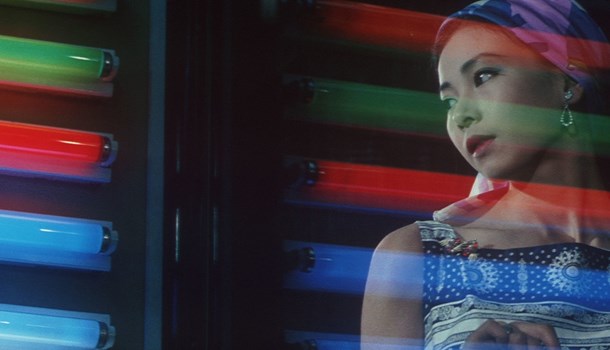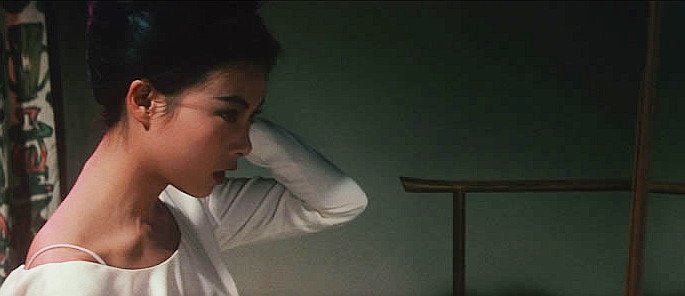
Written by Richard Durrance on 18 Apr 2024
Distributor Radiance • Certificate 18 • Price £17.99
As I have more than once alluded to, Radiance have had a fine start in releasing Japanese films in 2024 and the latest of which, The Shape of Night (1964), was graced with some lovely promo images when announced, but I’d managed to otherwise keep myself safe and secure from learning anything about the film's story. So I entered The Shape of Night cold and uninformed, with the weight of Radiance’s other releases weighing heavily upon it. Would it match them?
Young woman, Yoshie (Miyuki Kuwano) works at a factory by day and a bar by night and at the latter she meets a young businessman, Eiji (Mikijiro Hira). Has Yoshie found her dream man? Maybe not, Eiji starts to live off her meagre earnings, and it becomes apparent he’s a low-level yakuza who drags her into prostitution to pay their bills. Then is there the glimmer of escape? A ‘client’, an architect (Keisuke Sonoi), says he’d like to marry Yoshie.
So to answer my main concern, this is indeed no disappointment but another excellent addition to Radiance’s offerings.
The film opens with Yoshie well-dressed, confident, and clearly looking to pick up a man but she seems so secure in herself that you are unsure if she is a prostitute or a woman looking for a one-night stand. As openings go, the use of light and colour and how Miyuki Kuwano moves and expresses herself as Yoshie are evocative, precise and elegant; it is as good a start to a film as you could hope for. It’s hard not to be sucked into it all and the opening really emphasises the strongest aspects of the film, the careful use of image and how the film conveys meaning, the often visual luxuriousness but mainly it’s Miyuki Kuwano as Yoshie that shines brightest. She is immediately a standout, and as the story progresses the very centre of the film and her performance is superb. As we go back in time, visiting with a younger more innocent Yoshie, we see her meet Eiji, - apparently a businessman - in the bar she works in. Yoshie seems so different I was almost asking myself if they’d changed actor. Such is Kuwano’s capacity to continually adjust and nuance her performance so that no matter where she is in the arc of her character, she always brings a sense of realness to her; the performance is so assured that we can fully believe her innocent beginnings, as convincing in portrayal as the more confident and almost dismissive Yoshie at the end of her narrative arc; yet her character is always more complex than some of the simplicities potentially implied there. It's been a while since I've felt so struck by an actor in any film as I was with Kuwano, and if anything I wanted to explore the character she becomes more because she inhabits it so utterly.
Coming to the film as cold as I was, I was surprised where the film went, in part because of what it tries not to do. The narrative at times could be argued to reflect aspects of Kinji Fukasaku’s later Graveyard of Honour (1975), but at no point does the film have the same tone as that brilliant but admittedly disturbing film. If anything, the film avoids showing us much in the way of sex or nudity, it’s a drama that focusses instead remorselessly on Yoshie, which is why such import has to be placed on her strong and believable performance which ultimately has to carry the film. Afterall, the men she meets arguably couldn't, in part because they are not quite so rounded. True, in the case of the somewhat patronising and certainly sincere ‘client’ who wants to rescue Yoshie, he seems to see her more as a "type" than a real person, but we can see why she might be attracted to a man who for all his somewhat superciliousness genuinely seems to care and wants to help her escape the life she has been trapped into.
Perhaps the more intriguing of the two men is Eiji. Often what we are not told about him speaks volumes. It takes but a moment to realise as a yakuza he’s a failure; the sad reality though is how Yoshie pays for this, at first accepting who and what he is because of falling in love for the first time, but then being sucked deeper and deeper into the organisation's clutches to the point where Eiji is an adjunct and really it’s his yuakuza organisation that hangs over her head as the threat.
That said the yakuza are often absent but really make their presence felt when on screen. The director, Noburo Nakamura, handles this well, especially one rape scene where we are shown nothing except Eiji’s response to what is happening and the removal of shoes, one after the other, allowing us to understand and imagine the awful experience Yoshie is undergoing to ensure she ‘knows her place’ and continues to make money for the yakuza. Eiji is noticeably powerless and there is a fascinating switch between Yoshie and Eiji, as Eiji shows over the course of the film just how he might have been a very different person.
Something in this mix of such harsh reality set in such lush visual stylings creates a film that seems like few others, and I find it hard again to imagine why it hasn’t surfaced earlier, because even if one might not like the film it would be hard to suggest it doesn’t seem remarkable. How the film slowly allows Yoshie’s life and experiences to unfold is deftly handled, and Kuwano’s performance so nuanced and standout, that when added to such beautiful visual storytelling that it can't help but produce a hint of the special, the one-off, the unique.
Importantly though the film always keeps everything grounded with the characters, even those we barely see like Yoshie’s family, who when she briefly returns home remark she’s “dressed like a tart”, and for me this focus on character and keeping a sense of reality, even if matched to unusual visual stylings at time, is what makes the film seem so unique. There have been some comparisons to Wong Kar-wai, which is not surprising, his In The Mood For Love feels visually similar, and the colour tone seems almost borrowed from this film, but then both films are set in the mid-60s so this is really no surprise and perhaps In The Mood For Love was in fact a direct influence here, who knows? After all, In The Mood For Love's main musical theme was taken from Seijun Suzuki's Yumeji.
Arguably though, in those brief moments where Kuwano is absent the film is less luminous, but that may be because she affected me so deeply. From those first moments where her performance just seemed to command the screen, where she radiated confidence and seem to wear her character like a glove... well it knocked me right over.
Impressed, I was. The Shape of Night is a disturbing but fine and very mature drama, visually beautiful, and often superbly performed and one I would, without a doubt, heartily recommend.


Long-time anime dilettante and general lover of cinema. Obsessive re-watcher of 'stuff'. Has issues with dubs. Will go off on tangents about other things that no one else cares about but is sadly passionate about. (Also, parentheses come as standard.) Looks curiously like Jo Shishido, hamster cheeks and all.
posted by Richard Durrance on 02 Mar 2026
posted by Richard Durrance on 25 Feb 2026
posted by Richard Durrance on 12 Feb 2026
posted by Richard Durrance on 10 Feb 2026
posted by Richard Durrance on 07 Feb 2026
posted by Richard Durrance on 03 Feb 2026
posted by Richard Durrance on 27 Jan 2026
posted by Richard Durrance on 19 Jan 2026